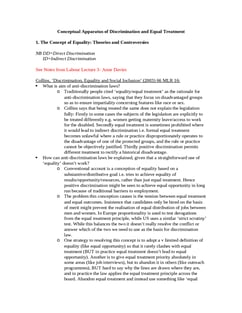Griffin v South West Water [1995] IRLR 15
Judgement for the case Griffin v South West Water
Table Of Contents
Blackburne J
Held that a privatised water company was a state emanation because it still carried out certain functions under the control of the state, which was important, because a directive on collective redundancy was only directly effective in the vertical sense.
The company (Defendant) decided not to recognise Unison but instead to set up a staff council and consultative committee.
Importantly, the case required an interpretation of national law on who the employees’ reps were, and in here s.188 TULRCA clearly meant that only recognised unions could be reps. A purposive approach couldn’t remove the work ‘recognised’ from the statute.
For Further Study on Griffin v South West Water
Need instant answers? Our AI exam tutor is here to help.
Ask questions 🙋 Get answers 📔 It's simple 👁️👄👁️
Our AI is educated by the highest scoring students across all subjects and schools. Join hundreds of your peers today.
Get StartedSimilar Cases
Related Product Samples
These product samples contain the same concepts we cover in this case.
| Labour Law | Economic Restructuring Redundancy+ Transfers Of Undertakings Notes (42 pages) |
| Labour Law | Representation At Work Notes (16 pages) |
| Labour Law | The Employment Relationship Notes (71 pages) |

 Since 2010, Oxbridge Notes has been a trusted education marketplace, supplying high-quality materials from top achievers at universities like Oxford, Cambridge, LSE, Harvard, and Yale.
Since 2010, Oxbridge Notes has been a trusted education marketplace, supplying high-quality materials from top achievers at universities like Oxford, Cambridge, LSE, Harvard, and Yale.